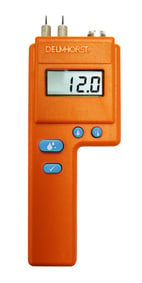Craftsmen can take days or even weeks shaping and assembling custom wood products. The best craftsmen obsess over every detail, making sure that their work is as free of defect as possible. Whether the woodwork product has a practical purpose or is a work of art, getting every last detail just right is a matter of pride.
To ensure proper attention to detail and the future longevity of their wood products, craftsmen need to have the right tools on hand. Three tools that every craftsman should have for woodworking are:
1: Thermo-Hygrometers
Proper acclimation is a must for ensuring that wood doesn’t warp or crack once it’s shipped to wherever it’s going to be used. Different areas of the country, however, have different ambient moisture conditions, which can make acclimating wood products difficult.
For example, if your workshop is in an area where wood’s equilibrium moisture content (EMC) is 8% MC, but you were shipping to an area where the EMC value is 11% MC, the wood can start to absorb extra moisture after reaching its destination.
This could cause the wood to swell , and my buckle, bow and distort surrounding material.
Thermo-hygrometers help to verify the ambient moisture conditions of a work area. With this information, craftsmen can adjust the climate conditions in their workshop or wood storage area to more closely match the conditions for the region where their products will be used. Acclimating wood in these conditions reduces the chances of problems later on.
 2: Moisture Meters
2: Moisture Meters
Naturally, to be able to verity that wood has reached its EMC value, craftsmen need some kind of testing device to measure the moisture content of wood. Woodworking moisture meters are a vital tool for checking the current %MC of wood.
By checking the %MC of wood over the course of several days, craftsmen can establish whether or not the wood has reached equilibrium content. This is vital information to have before taking raw materials and turning them into a finished product.
3: A Climate-Controlled Space to Work In
Another tool that craftsmen working with wood need is a climate-controlled space to work in. Having climate control in the work area helps craftsmen better acclimate their raw materials before using them for crafting a finished product.
Ideally, this work environment should be an enclosed space, one where exterior moisture and temperature conditions can be easily kept out year-round. Interior rooms in a building make for excellent areas to acclimate wood.
Areas that are repeatedly opened to exterior conditions, such as a garage, are not very ideal for controlling climate conditions.
The above three tools are ones that no craftsman working with wood should be without, but many might underestimate. Of course, there are many other tools that craftsmen need to properly work with wood. However, the specific tools may vary depending on what the craftsman is making; which is why this list focused on tools that are more universal, but often overlooked.
In particular, high-quality moisture meters are a must for avoiding many common woodworking moisture issues beyond simply checking the acclimation of wood.

Comments